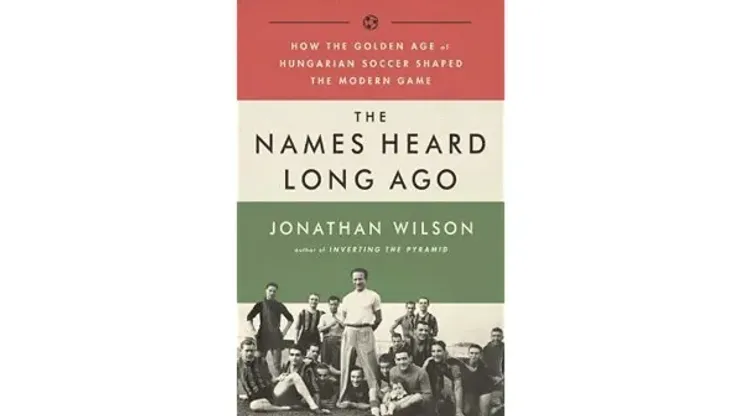When reading about the global history of soccer, inevitably the Hungarian national teams of the 1950s comes up. One of the greatest soccer teams ever, the post-WWII Hungarians humbled the English and taught the world a new way to play soccer. Yet so little is known about how the Hungarians became so good at soccer besides the generally incorrect assumption that the English and Scots taught them the game. The truth is more complicated and deep, and acclaimed journalist Jonathan Wilson reveals why in-depth studies of the Hungarian soccer revolution are not common.
The Names Heard Long Ago: How the Golden Age of Hungarian Soccer Shaped the Modern Game is sort of a spin-off of Wilson’s earlier book Behind the Curtain: Travels in Eastern European Football. In fact, that book he admits piqued his interest in studying more about Hungarian soccer and how they became a “game changing” national side. The Names Heard Long Ago begins at what some argue is the beginning of the nation’s soccer culture, which is pre-World War I Austro-Hungarians Empire Hungary. The main drivers were, as any whose read David Goldblatt know, Jimmy Hogan and coffeehouses. Moving past the First World War the soccer seed planted in Hungary really germinates as a non-English centric thinking about the game develops. Not coincidentally, that soccer culture grows up along side a cultural revolution in society. The culmination is of course the post World War II thrashing of England and Olympic glory.
A journalist of Wilson’s stature can get away with sometimes publishing a book with just enough research to make it credible. Some authors of his ilk simply rely on reputation to publish on a topic with just enough endnotes and references to not call their thesis into question. To his credit Jonathan Wilson put in the work to write this book. Throughout are footnotes (and more footnotes) which reference journals, newspapers, and academic tomes that are undeniably near impossible for most writers to access. This is true for soccer sources and cultural sources. While we have to assume he had a research team assisting, the depth of work put into this book years in the making is impressive.
SEE MORE: The Ultimate Guide To the Best Soccer Books
It is even more impressive considering how hard it is to write a history of Hungary. While it is not a developing nation, national records and reliable sources even from 100 years ago are sometimes hard to find. Consider the fact that many birth records are tied to Christian baptismal records, so Jewish players and coaches may not have government data about their actual birthplace available! In addition, two major wars and multiple chaotic government changes mean records have been purged or lost, making the information presented even more impressive.
Ultimately, is this book revolutionary? No. If you read The Ball is Round or even Behind the Curtain you get enough background on Hungarian soccer history to speak intelligently about it. However, I recommend this book simply because it is an informative, fascinating read. As I’ve mentioned with previous book releases this summer, this is not a book for a new soccer fan or even someone with casual knowledge of the game. If this book were a high school course, it would be an Advanced Placement course. That said, it is a good holiday or birthday gift for the big soccer fan in your life, and a great addition to the growing library of good soccer reads available commercially.
The Names Heard Long Ago: How the Golden Age of Hungarian Soccer Shaped the Modern Game
by Jonathan Wilson
Bold Type Books
400 pages
Available through Amazon and other booksellers beginning September 17
200+ Channels With Sports & News
- Starting price: $33/mo. for fubo Latino Package
- Watch Premier League, Women’s World Cup, Euro 2024 & Gold Cup
The New Home of MLS
- Price: $14.99/mo. for MLS Season Pass
- Watch every MLS game including playoffs & Leagues Cup
Many Sports & ESPN Originals
- Price: $10.99/mo. (or get ESPN+, Hulu & Disney+ for $14.99/mo.)
- Features Bundesliga, LaLiga, Championship, & FA Cup
2,000+ soccer games per year
- Price: $5.99/mo
- Features Champions League, Serie A, Europa League & Brasileirāo
175 Premier League Games & PL TV
- Starting price: $5.99/mo. for Peacock Premium
- Watch 175 exclusive EPL games per season






